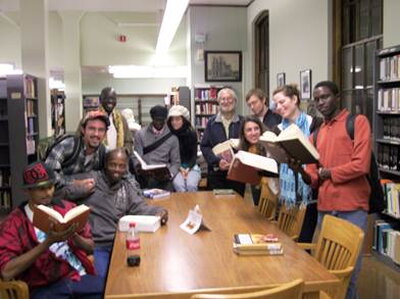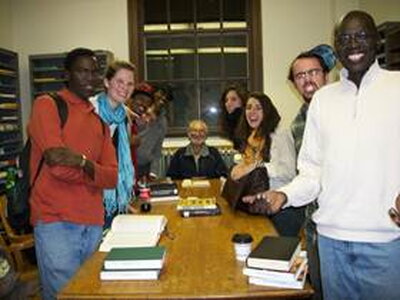

Al Kagan, the African Studies Bibliographer at the UIUC library, has spent two decades in service at this university. In July of this year he will officially retire. We spoke to him about his experience at the U of I and his ideas about the future of librarianship. We at the Center for African Studies are greatly appreciative of all that Al has done over the years to support our work and our students. We wish him a happy and productive retirement. We know he won’t forget us.
How did you first become interested in librarianship and African librarianship in particular?
I got interested in Africa when I was an undergraduate at Boston University. This was the period when most African countries were gaining their independence, and there was a lot of political experimentation. I was fascinated by the different models of “African socialism,” and hopes for a better future. Carrying this forward, I studied international relations at San Francisco State University and wrote a master’s thesis on East Africa. But I had no clear idea of what I wanted to do to earn a living, and after some travel and various jobs in Boston, I was asked to do a bibliography of theses and dissertations for the African Studies Association, then headquartered at Brandeis University. This project opened my eyes to the possibility of a career in African studies librarianship, and I decided to try working in a library before going back for a Master’s in Library Science. So I worked for a few years as a library assistant at Tufts University. After our union campaign was defeated by a very narrow margin, I decided that it was the time to go to library school. I applied for a unique assistantship at the time in African studies librarianship at Indiana University. David Easterbrook, who now heads the Melville J. Herskovits Library of African Studies at Northwestern University, gave me the assistantship at Indiana, and my path was established. David has been a mentor and good friend ever since.
When did you first come to the University of Illinois and what position did you hold then?
I arrived on September 1, 1992, as African Studies Bibliographer. They offered me a full professorship, and that was an offer that I could not refuse.
What do you think has been your proudest achievement during your time at the U of I?
I guess I would take the long view. I have worked as a core member of the Center for African Studies and tried to meet the library and research needs of the African studies faculty and students, in terms of collections and services. We have developed a very decent library website, and we also hosted and developed the very first Center for African Studies website. We probably have the best film collection about and from Africa in the United States, and we have one of the best collections of books and journals. But I have not limited myself to library matters, and I have participated in all aspects of the work of the Center for African Studies.
How has the role of libraries and librarians changed during your time here?
The digital revolution has transformed library practices. When I first arrived, we had a lot of students coming into the library to get information and do their papers. Students now expect everything to be online, and a lot more is done through email and the Internet. Most students do not initially realize that most materials from Africa are still only in printed format, and they must actually come to the library to find these books and journals. When I arrived and for most of my time here, we maintained a separate African Studies Library unit although we shared space with the Afro-American Library unit. This was a very nice arrangement since many students were interested in both the African continent and the African diaspora. Unfortunately, these two units were physically split, and Afro-American Studies went to the History, Philosophy, and Newspaper Library. We also had a vibrant Women’s Studies Library as part of the Area Studies Division, which had a heavy international emphasis including African materials. The Women Studies Library was closed some years ago, and the materials have been dispersed. All the remaining areas have been merged into the International and Area Studies Library, which also includes Global and European Union studies. After two years in this new arrangement, it is still unclear to me whether or not the benefits of this centralization of area studies outweighs the benefit of maintaining the previous decentralized structure.
During your time here, you have been much more than a librarian. You have been involved in a number of social justice issues both on campus, in the community, and in professional associations. Could you talk a little bit about why that work was important to you and how you think it might have connected to your position as a faculty member?
The work that I do around social justice is the most satisfying part of my life. As a faculty member with tenure, one has an extraordinary chance to do work that would put others in danger of losing their jobs. So I have not had to be overly brave to work on controversial issues. In that sense, I feel a sense of responsibility to challenge injustice. It would be terrific if more professionals incorporated this kind of work explicitly within their conception of their positions. I worked in the old Union of Professional Employees which has now transformed into the Campus Faculty Association (CFA). Although not an organization with collective bargaining rights (yet), the UPE/CFA has worked for years to defend the rights of faculty (and previously academic professionals) against arbitrary treatment, and to raise all kinds of justice related issues with the campus and university administrations, and to provide solidarity with other groups in the community, nation, and around the world.
Many years ago when I became a member of the Academic Senate, I realized that this body was little more than a rubber stamp for the campus administration. I therefore worked to change the Senate's culture, and eventually we formed a UPE/CFA Senate Caucus, which I continue to chair until the end of this semester. I think we made remarkable progress in changing the Senate environment, and some of the early members of the caucus have been and continue to be Senate leaders, but as usual there is still plenty more work to do. I also worked in the local anti-war movement for many years. I came into African studies through community work in the anti-apartheid and liberation support movements of the 1970s, mostly around the countries of Southern Africa. I think that experience has motivated me in my work with the Africana Librarians Council (ALC) of the African Studies Association and the Association of Concerned Africa Scholars (ACAS). My earliest ALC work was to develop guidelines for librarians to interact with apartheid South Africa, which were based on the ANC's selective boycott policy. And I have continued to bring my ACAS perspective to the ALC and the library profession. I work intensely in the Social Responsibilities Round Table (SRRT) of the American Library Association (ALA) to try to influence that large and influential body in progressive directions. I represent the Round Table on ALA's governing Council. And internationally, I convened and chaired for several years a Social Responsibilities Discussion Group within the International Federation of Library Associations and Institutions (IFLA). And of course, I have been able to work closely with some of my African colleagues in IFLA. All of this work has a common social justice perspective.

Do you have any parting words of advice for aspiring librarians, especially those with an interest in Africa?
This is a very difficult time to be a librarian. The profession is changing fast, and it is difficult to keep up with technological developments. The emphasis is often on technology as an end in itself, instead of as a means to an end. Therefore, jumping on the bandwagon of the latest trends can be problematical. New technologies, including social media applications, may come and go very quickly. The implementation of new technologies sometimes supersedes previous user-friendly systems. New librarians are expected to be technologically savvy. But they have often not been educated enough in the traditional library skills and orientation. My advice to new librarians is to honor our past professional practice and balance new technologies with our core values. We should not lose sight of our educational and societal goals because we are focused on technological advances. African studies librarianship is alive and well, but funding for conferences and professional development is decreasing. The decreased budgets for Title VI is one example of this trend. New librarians in search of African studies positions may have to start out as generalists or subject specialists in broader fields that include Africa. I had to do that myself until I came to UIUC. It is unlikely that full-time African studies positions will increase in the next decades.
Is there anything else you would like to tell our readers?
It has been a real pleasure and an honor to be our African Studies Bibliographer. I hope we can maintain and build on the work I have done for these many years.